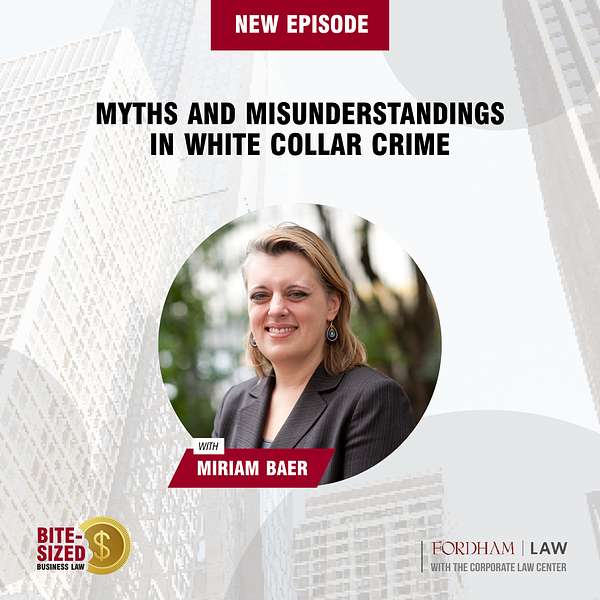
Bite-Sized Business Law
Looking for the latest in legal business news?
Get a breakdown of the top stories in business law from industry leaders on the front lines with Bite-Sized Business Law. Host Amy Martella takes a closer look at the latest corporate happenings through interviews with the attorneys, legal experts, public figures, and scholars behind the news to distill business law’s biggest stories into bite-sized portions.
This is your chance to go further into the world of business law and stay up to date with legal cases and industry trends.
Corporations impact us all, leading changes that extend far beyond business to shape the economy, public policy, technology, and beyond. Looking at the big picture, Amy discusses not only the underlying issues in business ethics and legal cases leading the biggest stories but also sparks thought-provoking discussions on where the law should be headed.
Amy is the Executive Director of the Corporate Law Center at Fordham University School of Law. Her background ranges from big law to government to tech startups, allowing her to offer an insider’s perspective of the issues that shape corporate actions, large and small. Covering crypto regulation to securities fraud, AI’s impact to Elon Musk’s pay package, Bite-Sized Business Law covers it all with guests of varying viewpoints to provide the nuanced analysis needed to tackle complex problems.
Whether you're looking for the latest in legal insight on intellectual property, mergers and acquisitions, business ethics or legal cases in the business law world, you’ll find it here. Enjoying a thoughtful perspective on the news stories of the moment, Bite-Sized Business Law examines big issues and delivers them in small doses.
Bite-Sized Business Law is a project by the Corporate Law Center at Fordham Law. The Center serves as a hub for scholars, professionals, policymakers, and students to engage in the study, discussion, and debate of current issues in corporate law. The Center focuses on aspects of corporate law, corporate compliance, antitrust law, and securities regulation. Through initiatives like the Mergers and Acquisitions seminar and the Securities Litigation and Arbitration Clinic, students actively engage in real-world research and cases, bridging the gap between classroom learning and practical application in the legal field.
Bite-Sized Business Law
Miriam Baer on Myths and Misunderstandings in White Collar Crime
For years, legal scholars have argued that the Federal Crime Code is broken. One key consequence of this is the alarming rise in white-collar and corporate crime — a shocking portion of which goes misreported and misunderstood. Joining us today to shed light on this urgent topic is Miriam Baer, Vice Dean and Centennial Professor of Law at Brooklyn Law School, whose new book, Myths and Misunderstandings in White-Collar Crime, provides an incisive breakdown of the flaws in our statutory system and what can be done to address it. Tuning in, you’ll learn about the experiences and real-life examples that inspired her to write this book, the problem of overcriminalization and under-enforcement in white-collar crime, her suggested reforms for tackling these systemic issues, and much more. Join us for a fascinating discussion on the state of white-collar crime and the value of conversations about reforming the system.
Key Points From This Episode:
•What inspired Miriam Baer to write Myths and Misunderstandings in White-Collar Crime.
•Who this book is for and why she wanted it to be accessible to a wider audience of readers.
•A closer look at overcriminalization and under-enforcement in white collar and corporate crime.
•The 2008 financial crisis and the lack of prosecution of those responsible.
•Understanding the various dynamics at play when prosecuting white-collar crime.
•The problem with “flat” and “umbrella” statutes and how this relates to the Federal Criminal Code.
•A look back at the college admissions scandal, also known as the Varsity Blues case.
•The argument for the federal code being carved into graded offenses.
•Details about the fraud triangle and what breeds this type of illicit behavior.
•Bringing about institutional change by putting resources toward front-end regulation.
•What Miriam means by flat laws and why it’s important to avoid these.
•The difference between flat laws and graded laws, and the benefits of graded laws.
•A historical perspective on why the Federal Criminal Code is not graded.
•The core problem of the sentencing guidelines in white-collar crimes.
•Tracking white-collar crime; what this entails and the importance of doing so accurately.
•A breakdown of suggested reforms and Miriam’s four recommended prescriptions.
•Unpacking the idea of intentionality in white-collar crimes.
•Whose job it is to ensure an overhaul of the systems under discussion.
Links Mentioned in Today’s Episode:
Miriam Baer Brooklyn Law School